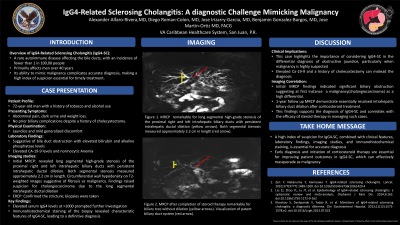Tuesday Poster Session
Category: Biliary/Pancreas
P3524 - A Case of Mistaken Identity: IGG4-SC Mimicking Malignancy
Tuesday, October 29, 2024
10:30 AM - 4:00 PM ET
Location: Exhibit Hall E

Has Audio

Alexander Alfaro, MD
VA Caribbean Healthcare System
San Juan, PR
Presenting Author(s)
Alexander Alfaro, MD1, Diego Roman-Colon, MD1, Jose Irizarry-Garcia, MD2, Benjamin Gonzalez-Burgos, MD1, Jose Martin-Ortiz, MD, FACG1
1VA Caribbean Healthcare System, San Juan, Puerto Rico; 2VA Caribbean Healthcare System, Guaynabo, Puerto Rico
Introduction: IGG4-related sclerosing cholangitis (IgG4-SC) is a rare autoimmune disease affecting the bile ducts in fewer than 1 in 100,000 people. This condition primarily strikes men over 40, and its ability to mimic other illnesses, especially malignancy, makes accurate diagnosis particularly challenging. A high index of suspicion is crucial for timely diagnosis and treatment, as IgG4-SC can significantly impact patient outcomes.
Case Description/Methods: A 72-year-old man with a history of tobacco and alcohol use presented with a concerning trio of symptoms: abdominal pain, dark urine, and weight loss. Interestingly, he had no prior biliary complications despite a history of cholecystectomy. This detail, often suggestive of prior biliary issues, was misleading in this case. Physical examination revealed jaundice and mild discomfort. Laboratory workup was suggestive of bile duct obstruction with elevated bilirubin and alkaline phosphatase levels. Furthermore, there was also elevated CA 19-9, anemia of chronic disease, and transaminitis. MRI/MRCP was consistent with common hepatic duct stricture with intrahepatic ductal dilation. In the clinical setting of a patient with cholecystectomy, these findings strongly suggested malignancy. ERCP confirmed the stricture, and a biopsy was performed. However, the plot took an unexpected turn: his serum IgG4 level was significantly elevated at a staggering 940.3. This unexpected finding prompted further investigation beyond the initial inconclusive biopsy results. Follow-up examination with immunohistochemical staining of the biopsy specimen revealed characteristic features of IgG4 sclerosing cholangitis, leading to the definitive diagnosis.
Discussion: This case exemplifies the importance of considering IgG4-SC in the differential diagnosis of obstructive jaundice, especially when malignancy is a leading suspect. Elevated CA 19-9 and even a history of cholecystectomy can be misleading in IgG4-SC. A high index of suspicion for IgG4-SC and a combination of clinical features, laboratory findings, including a significantly elevated serum IgG4 level, imaging studies, and potentially immunohistochemical staining are crucial for accurate diagnosis. Early diagnosis and initiation of corticosteroid therapy are essential to manage the autoimmune response and improve patient outcomes in IgG4-SC, which can effectively masquerade as malignancy.
Disclosures:
Alexander Alfaro, MD1, Diego Roman-Colon, MD1, Jose Irizarry-Garcia, MD2, Benjamin Gonzalez-Burgos, MD1, Jose Martin-Ortiz, MD, FACG1. P3524 - A Case of Mistaken Identity: IGG4-SC Mimicking Malignancy, ACG 2024 Annual Scientific Meeting Abstracts. Philadelphia, PA: American College of Gastroenterology.
1VA Caribbean Healthcare System, San Juan, Puerto Rico; 2VA Caribbean Healthcare System, Guaynabo, Puerto Rico
Introduction: IGG4-related sclerosing cholangitis (IgG4-SC) is a rare autoimmune disease affecting the bile ducts in fewer than 1 in 100,000 people. This condition primarily strikes men over 40, and its ability to mimic other illnesses, especially malignancy, makes accurate diagnosis particularly challenging. A high index of suspicion is crucial for timely diagnosis and treatment, as IgG4-SC can significantly impact patient outcomes.
Case Description/Methods: A 72-year-old man with a history of tobacco and alcohol use presented with a concerning trio of symptoms: abdominal pain, dark urine, and weight loss. Interestingly, he had no prior biliary complications despite a history of cholecystectomy. This detail, often suggestive of prior biliary issues, was misleading in this case. Physical examination revealed jaundice and mild discomfort. Laboratory workup was suggestive of bile duct obstruction with elevated bilirubin and alkaline phosphatase levels. Furthermore, there was also elevated CA 19-9, anemia of chronic disease, and transaminitis. MRI/MRCP was consistent with common hepatic duct stricture with intrahepatic ductal dilation. In the clinical setting of a patient with cholecystectomy, these findings strongly suggested malignancy. ERCP confirmed the stricture, and a biopsy was performed. However, the plot took an unexpected turn: his serum IgG4 level was significantly elevated at a staggering 940.3. This unexpected finding prompted further investigation beyond the initial inconclusive biopsy results. Follow-up examination with immunohistochemical staining of the biopsy specimen revealed characteristic features of IgG4 sclerosing cholangitis, leading to the definitive diagnosis.
Discussion: This case exemplifies the importance of considering IgG4-SC in the differential diagnosis of obstructive jaundice, especially when malignancy is a leading suspect. Elevated CA 19-9 and even a history of cholecystectomy can be misleading in IgG4-SC. A high index of suspicion for IgG4-SC and a combination of clinical features, laboratory findings, including a significantly elevated serum IgG4 level, imaging studies, and potentially immunohistochemical staining are crucial for accurate diagnosis. Early diagnosis and initiation of corticosteroid therapy are essential to manage the autoimmune response and improve patient outcomes in IgG4-SC, which can effectively masquerade as malignancy.
Disclosures:
Alexander Alfaro indicated no relevant financial relationships.
Diego Roman-Colon indicated no relevant financial relationships.
Jose Irizarry-Garcia indicated no relevant financial relationships.
Benjamin Gonzalez-Burgos indicated no relevant financial relationships.
Jose Martin-Ortiz indicated no relevant financial relationships.
Alexander Alfaro, MD1, Diego Roman-Colon, MD1, Jose Irizarry-Garcia, MD2, Benjamin Gonzalez-Burgos, MD1, Jose Martin-Ortiz, MD, FACG1. P3524 - A Case of Mistaken Identity: IGG4-SC Mimicking Malignancy, ACG 2024 Annual Scientific Meeting Abstracts. Philadelphia, PA: American College of Gastroenterology.
